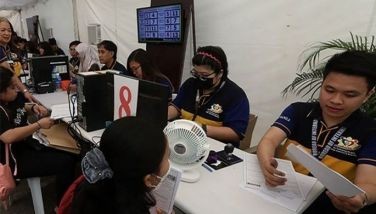Enabling MSMEs in the digital economy

Going digital is one of the hottest topics in the business community lately, with many traditional brick and mortar businesses launching online platforms for their companies, and new digital players emerging in the industry. Because of this, I strongly believe digital is a great equalizer for micro and small entrepreneurs.
Last April 26, I, together with my digital adviser Jopin Romero who is also a fintech player, led the first dialogue on enabling MSMEs, through the digital economy with government officials, fintech and e-commerce players.
Present in the meeting were Bangko Sentral ng Pilipinas (BSP) Deputy Governor Chuchi Fonacier, Rep. Peter Unabia, Gov. Abet Garcia of Bataan, Gil Gonzales (ASEAN BAC), Ron Tucker (Australia Digital Commerce Association), Anthony Thomas (Mynt), Lito Villanueva (FintQ), Dindo Marzan (Voyager Innovations), Andres Torres (Coca-Cola FEMSA Philippines), Eugene Acevedo (UnionBank), Mark Ruiz (Hapinoy), Ed Sunico (Unilever Philippines), Ibba Bernardo (Sari.ph), Martin Yu (Shopee), Lawrence Ferrer (Paymaya), Ivy Piedad (Puregold), among others.
I have always grounded my advocacy with the 3Ms: mentorship, money, and market. As you all know, we have partnered with government institutions like DTI, DA, and DAR in providing mentorship with the offline sector.
But to me, the biggest game changer is the digital economy which is also a disruptor for big businesses. We want to see both offline and online businesses complementing each other. MSMEs must embrace online because it provides them with a platform where they can have e-wallets and transact online. Through e-wallet, SMEs will be able to manage their finances better. I think that as we move forward, we want our country to be more digitally inclusive which is why our Kapatid partners have been developing ways to digitally enable MSMEs with the right technologies and environment.
BSP Dep. Gov. Fonacier reported that most unbanked Filipinos have mobile phones that contribute to the increase in the number of people engaging in digital payments. However, there’s still a very long way to go as far as digitalization and fintech is concerned. She shared that in the recent Findex study, 41 percent of unbanked adults cited that the distance to a financial institution hinders them from owning a formal bank account. Another concern is the development of a national ID system which will aid in opening a basic account. We are glad that even the BSP has taken a huge step forward in digital payments as they have recently launched PESOnet and InstaPay. All these are being implemented with the hope of engaging more Filipinos to go digital.
We are glad to hear from Lito Villanueva that there is a fintech alliance wherein several stakeholders have teamed up to accelerate digitalization. Lito also shared that through Kasama Ka, a community-based, self-help, income-generating, and inclusive ecosystem-building movement, MSMEs will now be provided with alternative access to cheap finance. They also have the Lendr which is a digital lending platform. These programs are in support of the goal of having 30 million Filipinos form a financial system by year 2020.
But the real point to the meeting is how do we hasten the connection and get everybody on board. It is a challenge for many players on how we can all ask every sari-sari store or micro entrepreneur to invest and train themselves for digital inclusion. There are 1.2 million sari-sari stores in the country, a large industry we can all target. Eugene Acevedo of UnionBank agrees that “sari-sari stores are not the last mile; they are the first mile since Filipinos see sari-sari stores as their main point of contact.”
Anthony of Mynt reiterated that incentives are needed for micro entrepreneurs to start accepting electronic payments and that aside from the e-wallet, other formats include smartphones for payments. There should be a change in mindset as Andres Torres of Coca-Cola said. It is an investment for sari-sari store owners to put their money into an electronic device.
Ibba Bernardo raised a different approach wherein some mompreneurs are actually embracing technology and can run urban stores where she can post promos in her social media accounts and actually engage with her clients. Lawrence Ferrer then raised concern on data connection, which hinders digital advancement most especially in remote areas. Dindo suggested if FMCGs can sponsor data for their sari-sari store partners, it would enable them to go online.
I also invited Mark Ruiz of Hapinoy since they have been in touch with sari-sari stores for the past 11 years and have worked with FMCG companies. He shared that it is important to determine the desire for growth of sari-sari stores. As we also have noticed for the past years, many of our micro entrepreneurs run their business by survival. Meaning most of them are really not into growth and sustainability.
Aside from the incentives raised, it is in developing a user-friendly interface which would help educate buyers and sellers with their services as Martin of Shopee has pointed out. Shopee educates people on how to use their application, an online marketplace for micro-entrepreneurs.
Following the concern on education, Ed Sunico shared that through their “Kalyeserye,” they were able to find the right people to mentor and teach them the basics on entrepreneurship, similar to what we have been doing in our mentorship program. We are also fortunate that we had Gov. Garcia in the meeting as Bataan is one of the fastest growing local economies in the country. He reported that they plan to provide incentives for small businesses who will be part of the initiative. He is also willing to make Bataan to be a proof of concept, a pilot project site for all fintech programs.
Lastly, Rep. Peter Unabia gladly informed us that they are working on the legislation needed for MSMEs to scale up. Recently, they proposed a multimillion budget for the Kapatid Mentor Me Program, one of Go Negosyo’s efforts in scaling up MSMEs through mentorship.
I thank all the attendees in the meeting for actively participating in the digitalization of MSMEs. We are really serious about this. The private sector is doing their part in connecting the consumers, merchants, and different networks to one inclusive ecosystem.
There are many things and pain points to address so we still have a long way to go but this is a good start. Digital will make the economy inclusive and we will achieve prosperity for every Filipino.
- Latest
- Trending































